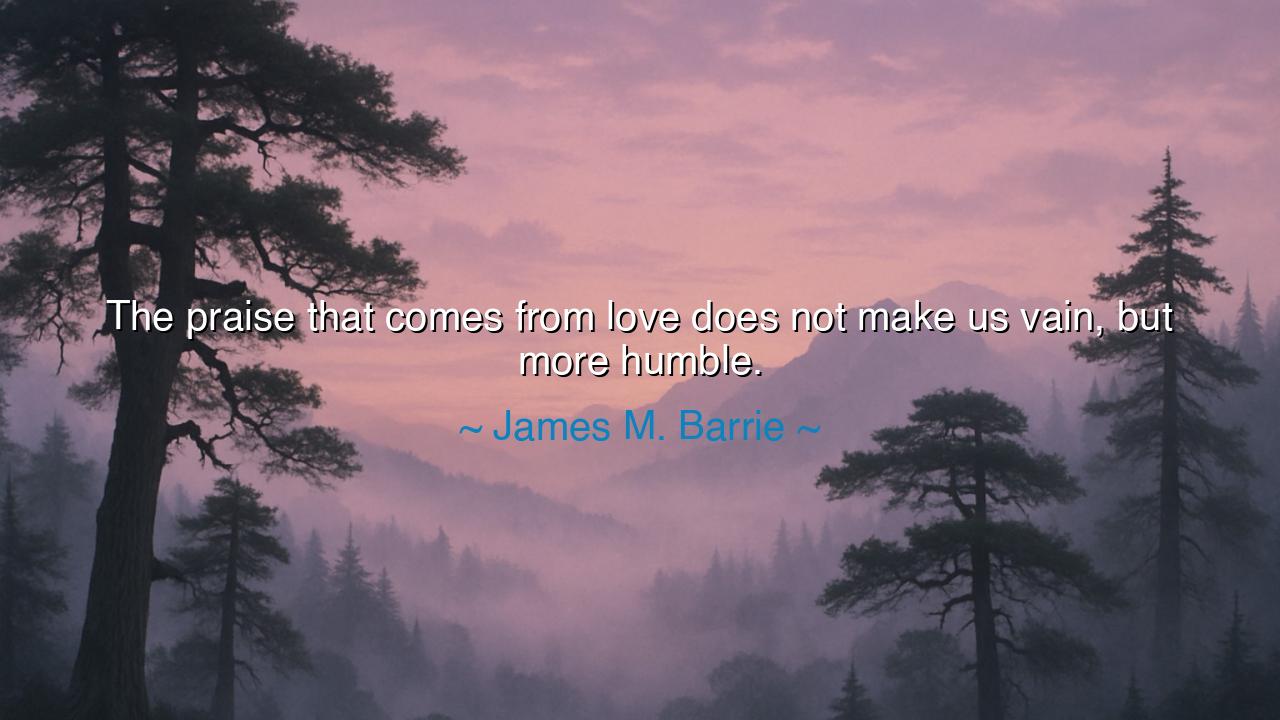
The praise that comes from love does not make us vain, but more






"The praise that comes from love does not make us vain, but more humble." These wise words from James M. Barrie illuminate the true nature of love and its transformative power. In the pursuit of affection, we often seek approval, but when love is the source of praise, the effect is not one of pride, but of humility. The praise we receive from those who truly love us is not empty flattery, but an acknowledgment of our deepest essence—our character, our kindness, and our worth. It is through the love of others that we are most deeply understood, and the recognition we receive only reminds us of the shared bond we have with them. It is not a praise that elevates the ego, but one that softens it, grounding us in the recognition that we are part of something greater than ourselves.
In the ancient world, the great philosophers understood the complex relationship between love and humility. Socrates, for instance, believed that true wisdom is found in the recognition of one’s own ignorance. To love is to open oneself to the world, and in doing so, to learn humility. Plato echoes this sentiment in his Symposium, where love is not a pursuit of ego or power, but a search for truth, for the greater good. The praise that comes from love is not self-serving, but serves to deepen the bond between the lover and the beloved, reminding us that we are all part of a greater whole, and that our value is found not in our outward achievements, but in the love we give and receive.
Consider the life of Alexander the Great, whose conquests and military achievements made him one of the most celebrated figures in history. Yet, beneath his glory, Alexander was deeply affected by the love and admiration of those who followed him. His most trusted generals and companions, like Hephaestion, offered him praise, not as a king or conqueror, but as a friend, a comrade, and a person of value. The praise Alexander received from his inner circle did not inflate his ego; rather, it made him more aware of his vulnerabilities and responsibilities. He sought the love of his people and of his closest allies, not because it made him feel superior, but because it reminded him of his humanity and the bond he shared with those around him.
Similarly, the life of Mother Teresa illustrates Barrie’s point in profound ways. Throughout her life, Mother Teresa received countless words of praise for her work with the poor and the sick. However, despite the accolades and recognition from all corners of the world, her humility remained her defining characteristic. The love she received from those she served, as well as from the many people who admired her, did not make her proud, but instead deepened her sense of responsibility. She would often say that she was nothing, merely a vessel through which love and compassion flowed. The praise that came from love did not feed her ego; it fed her desire to give more, to serve more, to be more present to the needs of others. In this way, love became the source of her humility, rather than her pride.
Barrie’s words also reveal an important truth about self-worth. In a world often driven by competition, comparison, and outward achievement, the praise of those who truly love us offers a form of recognition that is not tainted by the pursuit of personal gain. It is a reflection of our character, our inner goodness, and our ability to connect deeply with others. When praised by those who love us, we are reminded that our true value does not lie in outward success, but in the love we give, the kindness we share, and the lives we touch. This recognition nurtures humility, for it reminds us that our worth is not built upon personal accomplishment, but upon the bonds we create through love.
The lesson that Barrie imparts is one of profound understanding. When we are loved, the praise we receive does not inflate our ego; instead, it opens our hearts to gratitude and humility. It helps us see that we are not alone in the world, that we are part of something far greater than ourselves. This kind of love calls us to be better, to grow in character, and to continue giving freely of ourselves, knowing that our worth lies not in how the world sees us, but in how we love and care for others.
In your own life, let the praise that comes from love be a reminder not of your greatness, but of your connection to others. Let it ground you in humility, helping you see that your true value lies not in outward accolades, but in the heartfelt bonds you create. When praised, accept it with grace and thankfulness, recognizing that true love elevates us, not by inflating our pride, but by teaching us to be more self-aware, more present, and more compassionate. Let the praise you receive from love deepen your humility, and may it inspire you to give even more of yourself to those around you, enriching the lives of others as you continue to nurture the love that sustains you.






AAdministratorAdministrator
Welcome, honored guests. Please leave a comment, we will respond soon